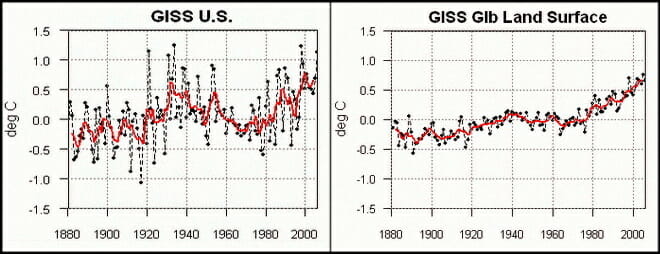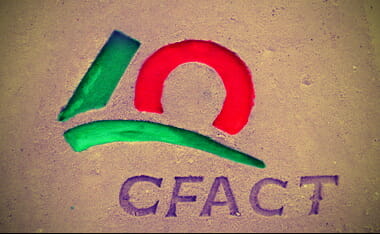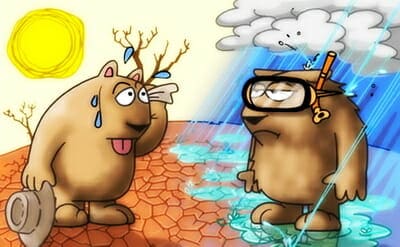We know in order to get the temperatures NASA and NOAA wish to promote…. they do not use the data from satellites when they state such things as 2015 was the warmest year on record. Whereas a 100% of satellites agree that temperature has been steady, a 100% of the modeling has been wrong.
Instead, they use readings from places like these that they can then add an addition algorythm to to “fix” the data:
In fact, since NASA/NOAA changed the temps due to McIntyre’s work, had the hottest years listed as: 1998, 1934, 2006, 1921 and 1931. NASA then changed them to…
- 1934, 1998, 1921, 2006 and then 1931;
- then again to, 1998, 2006, 1934, 1921, 1999.
These government, taxpayer associations that should make data for such “corrections” available to the public representatives, instead, they refused to hand over what should have been easy info to give. This obfuscation by these public institutions are summed up well by McIntyre:
…“Fixing” bad data with software is by no means an easy thing to do (as witness Mann’s unreported modification of principal components methodology on tree ring networks.) The GISS adjustment schemes (despite protestations from Schmidt that they are “clearly outlined”) are not at all easy to replicate using the existing opaque descriptions. For example, there is nothing in the methodological description that hints at the change in data provenance before and after 2000 that caused the Hansen error. Because many sites are affected by climate change, a general urban heat island effect and local microsite changes, adjustment for heat island effects and local microsite changes raises some complicated statistical questions, that are nowhere discussed in the underlying references (Hansen et al 1999, 2001). In particular, the adjustment methods are not techniques that can be looked up in statistical literature, where their properties and biases might be discerned. They are rather ad hoc and local techniques that may or may not be equal to the task of “fixing” the bad data.
Making readers run the gauntlet of trying to guess the precise data sets and precise methodologies obviously makes it very difficult to achieve any assessment of the statistical properties. In order to test the GISS adjustments, I requested that GISS provide me with details on their adjustment code. They refused. Nevertheless, there are enough different versions of U.S. station data (USHCN raw, USHCN time-of-observation adjusted, USHCN adjusted, GHCN raw, GHCN adjusted) that one can compare GISS raw and GISS adjusted data to other versions to get some idea of what they did….
He then goes on to explain the lack of detail from the GISS numbers via the U.S. compared to the global temps:
…These differences are attributed to “regional” differences and it is quite possible that this is a complete explanation. However, this conclusion is complicated by a number of important methodological differences between the U.S. and the ROW. In the U.S., despite the criticisms being rendered at surfacestations.org, there are many rural stations that have been in existence over a relatively long period of time; while one may cavil at how NOAA and/or GISS have carried out adjustments, they have collected metadata for many stations and made a concerted effort to adjust for such metadata. On the other hand, many of the stations in China, Indonesia, Brazil and elsewhere are in urban areas (such as Shanghai or Beijing). In some of the major indexes (CRU,NOAA), there appears to be no attempt whatever to adjust for urbanization. GISS does report an effort to adjust for urbanization in some cases, but their ability to do so depends on the existence of nearby rural stations, which are not always available. Thus, ithere is a real concern that the need for urban adjustment is most severe in the very areas where adjustments are either not made or not accurately made.
In its consideration of possible urbanization and/or microsite effects, IPCC has taken the position that urban effects are negligible, relying on a very few studies (Jones et al 1990, Peterson et al 2003, Parker 2005, 2006), each of which has been discussed at length at this site. In my opinion, none of these studies can be relied on for concluding that urbanization impacts have been avoided in the ROW sites contributing to the overall history….
This led to some interesting bullet points I note over at another recent post about 1934:
- According to data on the NOAA website, 1997 was truly the hottest year on record at 62.45 oF. The average global temperature in 2015 was 58.62 oF or 3.83 oF below the 1997 temperature.
- According to data on the NOAA website, the temperatures such as the 20thcentury average temperature and annual temperature anomalies, which must be fixed, have different values in the annual global analyses.
- NOAA and NASA corrected historical temperature data and fabricated temperature data in areas without temperature record systematically, widely, and uni-directionally to “cool” the past in an attempt to prove the soaring temperature trend.
- NOAA and NASA made efforts to discredit their own satellite data – which is consistent with the balloon data – because it suggests a global warming hiatus since 1998 contradicting with the NOAA and NASA preferred narrative.
- NOAA and NASA refused to give data and information requested by the US House of Representatives Science, Space and Technology committee. There is no reason for them to withhold the data and information, which are public domain, unless they have something to hide.
This caused people to wonder if NASA/NOAA were doing the same thing as the Europeans had been caught doing. So the requests for the records started being made. Here is the WASHINGTON TIMES talking about it in 2009:
…The center’s chief has stepped down pending an investigation into the e-mails.
The center has also had to acknowledge in response to a freedom of information request under British law that it tossed out much of the raw data that it used to draw up the temperature models that have underpinned much of the science behind global warming.
Mr. Horner suspects the same sort of data-shaving has happened at NASA’s Goddard Institute for Space Studies (GISS), another leading global warming research center.
Mark Hess, public affairs director for the Goddard Space Flight Center which runs the GISS laboratory, said they are working on Mr. Horner’s request, though he couldn’t say why they have taken so long.
[….]
NASA’s GISS was forced to update its data in 2007 after questions were raised by Steve McIntyre, who runs ClimateAudit.com.
GISS had initially listed the warmest years as 1998, 1934, 2006, 1921 and 1931. After Mr. McIntyre’s questions GISS rejiggered the list and 1934 was warmest, followed by 1998, 1921, 2006 and then 1931. But since then, the list has been rewritten again so it now runs 1998, 2006, 1934, 1921, 1999.
The institute blamed a “minor data processing error” for the changes but says it doesn’t make much difference since the top three years remain in a “statistical tie” either way.
Mr. Horner said he’s seeking the data itself, but he also wants to see the chain of e-mails from scientists discussing the changes.
The Freedom of Information Act requires agencies to respond to requests within 20 days. Mr. Horner says he’s never received an official acknowledgement of his three separate FOIA requests, but has received e-mails showing the agency is aware of them.
He said he has provided NASA with a notice of intent to sue under FOIA, but said he also hopes members of Congress get involved and demand the information be released.
NASA and CRU data are considered the backbone of much of the science that suggests the earth is warming due to manmade greenhouse gas emissions. NASA argues its data suggests this decade has been the warmest on record.
On the other hand, data from the University of Alabama-Huntsville suggests temperatures have been relatively flat for most of this decade.
In fact, JUDICIAL WATCH has had to get involved as of late 2015:
…Judicial Watch sued the Department of Commerce after the agency failed to respond to a Freedom of Information Act (FOIA) request submitted on October 30, 2015 – NOAA is a component of the Department of Commerce. The timeframe for the requested records is October 30, 2014, through October 30, 2015, and requests all documents and records of communications between NOAA officials, employees, and contractors regarding:
- The methodology and utilization of night marine air temperatures to adjust ship and buoy temperature data;
- The use of other global temperature datasets for both NOAA’s in-house dataset improvements and monthly press releases conveying information to the public about global temperatures;
- The utilization and consideration of satellite bulk atmospheric temperature readings for use in global temperature datasets; and
- A subpoena issued for the aforementioned information by Congressman Lamar Smith on October 13, 2015.
[….]
On November 26, Smith published an opinion editorial in The Washington Times, which accused NOAA of tampering with data to help promote global warming alarmism:
NOAA often fails to consider all available data in its determinations and climate change reports to the public. A recent study by NOAA, published in the journal Science, made “adjustments” to historical temperature records and NOAA trumpeted the findings as refuting the nearly two-decade pause in global warming. The study’s authors claimed these adjustments were supposedly based on new data and new methodology. But the study failed to include satellite data.
“We have little doubt that our lawsuit helped to pry these scandalous climate change report documents from the Obama administration. The Obama administration seems to care not one whit for a congressional subpoena but knows from prior experience that a Judicial Watch FOIA lawsuit cannot be ignored,” said Judicial Watch President Tom Fitton. “Given the lawless refusal to comply with our FOIA request and a congressional subpoena, we have little doubt that the documents will show the Obama administration put politics before science to advance global warming alarmism.”
Judicial Watch previously investigated alleged data manipulation by global warming advocates in the Obama administration. In 2010, Judicial Watch obtained internal documents from NASA’s Goddard Institute for Space Studies (GISS) related to a controversy that erupted in 2007 when Canadian blogger Stephen McIntyre exposed an error in NASA’s handling of raw temperature data from 2000-2006 that exaggerated the reported rise in temperature readings in the United States. According to multiple press reports, when NASA corrected the error, the new data apparently caused a reshuffling of NASA’s rankings for the hottest years on record in the United States, with 1934 replacing 1998 at the top of the list….
I have a feeling this will end badly for NASA/NOAA. Why do I say that? Because if they have nothing to hide then there is no reason for them to withhold the data and information, which are public domain.
Here is the DAILY CALLER discussing the issue:
…The documents revealed a “new climate data scandal,” Judicial Watch said in announcing the suit.
“Information provided to the committee by whistleblowers appears to show that the study was rushed to publication despite the concerns and objections of a number of NOAA employees,” according to the committee.
Committee Chairman Lamar Smith wrote recently that “NOAA often fails to consider all available data in its determinations and climate change reports to the public.”
The Texas Republican also noted that a recent NOAA study made adjustments to historical temperature records, which led the findings to refute a nearly two-decade pause to global warming….
Whistleblowers are never a good sign.










